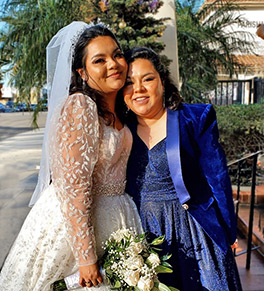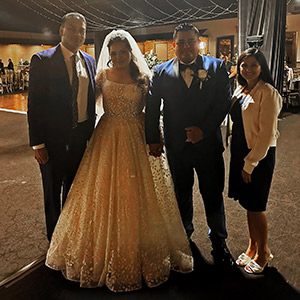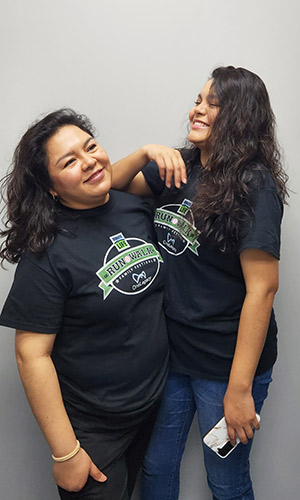Organ donation, a gift that endures

"A simple thank you isn't enough," says new bride Xenia Morales, who received a kidney from her sister and maid of honor, Nadia Morales, right. "Everything I am, everything I've done, none of it would have been possible without her."
Xenia Morales is not only surviving, the 32-year-old kidney transplant patient is thriving.
Last year she completed a psychology degree, has applied for a master’s program and just married her high school best friend, with her big sister and organ donor by her side as maid of honor.
“She’s my hero, my guardian angel,” the new bride says of Nadia Morales, 36. “None of this would have been possible without her. She gave me what no one else could — life.”
Neither could have imagined so joyous an outcome when Xenia was at death’s door in complete kidney failure just after Christmas in 2013.
Xenia, then 23, had been healthy throughout that holiday season and was preparing to start a new job when she suddenly fell ill and was rushed to a local emergency department. Her blood was the color of pink lemonade because her kidneys couldn’t filter out the waste products and fluids from her system.
It took 10 units of blood to stabilize her, but the emergency department doctors told the Morales family she needed immediate intervention or she would die.
Surviving with dialysis
Xenia turned to the nephrologists at UCI Health and started regular hemodialysis treatments to do the job of her kidneys. Most kidney failure patients are considerably older with a variety of health issues, including complications from diabetes. In Xenia's case, doctor's believe her kidneys were stunted when she was born prematurely.
Through numerous hospitalizations, doctors’ visits and long hours hooked up to dialysis machines to cleanse her blood, Nadia was at Xenia’s side, encouraging her whenever she felt hopeless. Nadia researched at-home blood purification, called peritoneal dialysis, and took on the role of caregiver, cleaning and hooking up the dialysis lines to keep her younger sister alive.
Xenia’s name was added to the list of kidney failure patients in need of a transplant, but she was told the wait could be as long as 10 years because of a shortage of deceased and live donors. Nadia immediately set about researching kidney donations.
Before long, tests showed that she matched five of six of her sister's biomarkers, which significantly reduces the risk of rejecting the donor organ. On Dec. 15, 2014, Xenia received one of Nadia’s kidneys, which they call Nanichii — combining Xenia’s childhood name for Nadia (Nana) and that of the surgeon who performed the transplant, Dr. Hirohito Ichii.
“If Nadia hadn’t been a match, Xenia would probably still be waiting,” says her nephrologist, Dr. Uttam Reddy, medical director of the UCI Health Kidney Transplant Program. “Many people we’re transplanting now got on the list in 2013 when Xenia did.”
Starting life anew

Once Xenia regained her health, she completed her psychology degree and applied for Cal State Fullerton's marriage and family counselor master’s program. She also thought about Fernando Guerrero, her best friend from the first day of high school onward until she lost touch during her long illness.
When she found him on social media, they began chatting and reminiscing as though no time had passed. Romance followed, but Xenia took a year to accept his marriage proposal because she feared losing what she valued most, their friendship.
On Jan. 6, 2023, the couple exchanged vows at the Blessed Sacrament Church in Westminster in front of family and friends. After clearing a patient for transplant surgery, Reddy attended the wedding reception with his wife, Dr. Radhika Reddy, a UCI School of Medicine assistant professor of pulmonology who practices at the VA Long Beach Health System.
The rest of the transplant team was also invited, but they were busy transplanting a healthy kidney into another needy patient.
Reddy, who saw Xenia again at her quarterly checkup in early February, says both sisters are doing great. With a little advance planning and adjusting of her anti-rejection medications, he says the couple could start their own family when the time is right.
“We’ve had about 20 successful pregnancies over the last several years,” he says.
Living donors needed

In the meantime, Nadia, who manages a medical practice, and Xenia, who works for her church, volunteer their time helping UCI Health kidney failure patients and potential donors through the UCI Health Living Donor Program.
The UCI Health kidney transplant program, Orange County's oldest and largest, receives about 1,000 patient referrals each year. Nearly 800 patients are currently on the waiting list, about 130 of whom underwent a transplant last year. It's nowhere near enough to meet the need. Nationally, more than 25,000 transplants were performed last year, but nearly 100,000 more await a donor kidney.
The sisters’ efforts to raise awareness about the living donor program have been invaluable, particularly among the Spanish-speaking community, who make up more than half their patients, Reddy says.
“Last year we started a pilot program with the National Kidney Registry called 'Big Ask, Big Give' that was tailored for a Hispanic audience. Nadia and Xenia gave a presentation in Spanish that definitely made a difference.”
Although Nadia hasn't had any health issues since donating her kidney, she tries to reassure potential donors who may be fearful. Even Xenia was reluctant to take Nadia’s kidney lest anything happen to her big sister.
“Education is key and once you know what’s going on, the benefits really outweigh the risks,” Nadia says. “There is life after organ donation, for the donor, the patient and their family. Xenia was only six months on the transplant list and those six months were agony.”
Xenia and her husband are marking their first Valentine's Day as a married couple. She and Nadia are also celebrating on Feb. 14, which is National Donor Day.
Nadia never questioned her decision to give Nanichii to her sister. “Xenia was like a delicate little flower and now she has become this beautiful blossom. Seeing her fulfill her dreams, I feel so grateful. I would do it again if I could.”




